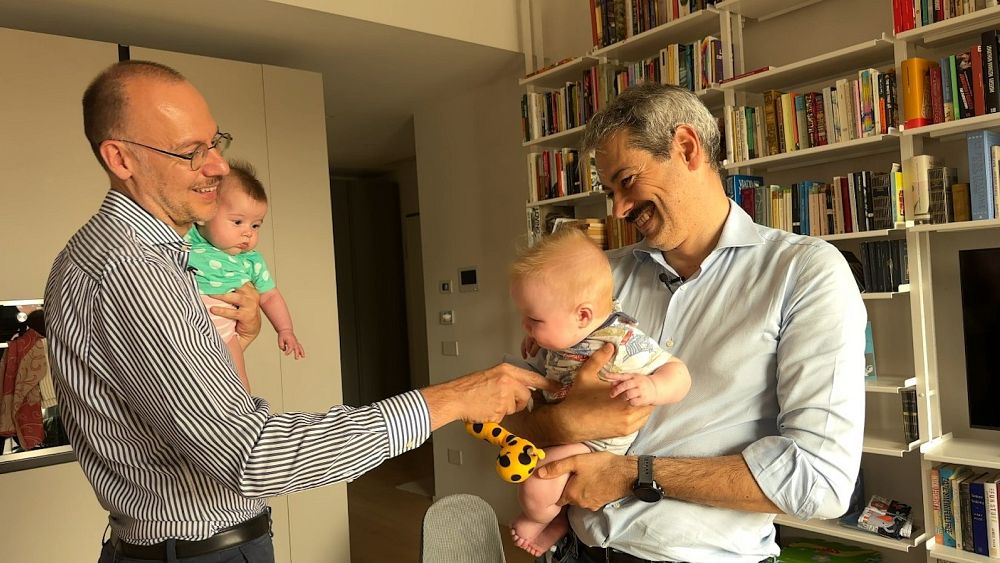
On a crusade for the defence of traditional families, Italy’s Prime Minister Giorgia Meloni wants to make surrogacy carried out abroad by Italian couples a crime, after stepping up restrictions on homosexual couples’ already limited rights to parenthood.
The government is also hardening its stance towards homoparental families. Municipalities which so far granted birth certificates recognising same-sex parents, have been summoned to stop doing so.
Euronews’ reporters Valérie Gauriat and Davide Raffaele Lobina travelled around Italy to find out what the implications are for the families concerned.
Surrogacy abroad as a universal crime
Surrogacy is already banned in Italy, as in many european States. The Italian Prime minister and her far-right party Fratelli d’Italia, backed by the right-wing coalition government, now want Parliament to vote a bill of law criminalising Italian citizens resorting to the practice in countries where it is legal.
Debora and Michele got married in 2012 with a dream of building a large family. But Debora was diagnosed with acute endometriosis. A pregnancy would be far too risky for her. After trying to adopt children in vain, they considered resorting to surrogacy abroad, since it is illegal in Italy. The new bill could compromise their plans.
“We are once again blocked by this bill. Everyone is scared.”, said Debora. Were the bill to pass, the couple could face up to two years of reclusion and a heavy fine if they carry on with their project.
Making surrogacy carried out abroad a crime would be legally untenable, says Filomena Gallo, the national secretary of the association Luca Coscioni in Rome. According to this lawyer, it would be an attack on the sovereignty of countries where the practice is legal.
Her association has initiated a counter-proposal to legalise non-commercial so called- “solidarity” surrogacy. The bill provides that the surrogate mothers make a deliberate choice, are under 42 years old, already mothers, and economically independent.
It would also remove the ban on single people and same-sex couples accessing medically assisted procreation techniques. “We are in 2023. There are various forms of families” says Filomena Gallo. “We cannot claim that for the sake of a political position, these families be excluded from our country.”
An offence against same-sex families
The debate over the bill on surrogacy abroad adds to the controversy sparked by the government’s offensive against same-sex parenthood.
In Italy, adoption and medically assisted procreation techniques are banned for homosexual couples. Those who found options abroad were able for the past few years to register the birth certificates of their newly-borns, recognising both parents, in some Italian cities. But the government has summoned municipalities to stop doing so.
Mauro and Maurizio live in Milan. Their twin babies, Luisa and Giorgio, were born through surrogacy in the United States last January. Their American birth certificates, recognising both fathers, were to be transcribed at the Civil Register in Milan, one of the Italian cities that authorised it. A recent circular from the Interior Ministry now prohibits it.
“They are not recorded at the Civil register as italian citizens. They have no legal protection in this State”, ” explains Maurizio. “The children didn’t have the right to be registered in the health system, nor to have a pediatrician. We couldn’t enroll them in the nursery. They have no administrative identity. For the state they are nobody. For Italy, at the moment they have no parents. If something were to happen to either of us, the children would not be protected.” adds Mauro. “This a cruel policy aimed at punishing parents, but in reality, it punishes children by depriving them of their rights and protection”, he concludes.
The Padua case
In Padua, in the north of Italy, the denial of same-sex parenthood has taken an even more drastic turn. The public prosecutor has challenged 33 birth certificates of children born to lesbian couples dating back as far as 2017.
Irene and Laura married in Canada. Their children, Alessandra and Davide, were born through in vitro fertilisation abroad. The couple was notified that Alessandra’s birth certificate would be rectified by cancelling the surname of the so-called non-biological mother. They expect the same notification for their son Davide. If a court confirms the prosecutor’s move, their children would officially no longer be brother and sister. “The fact that the State acted against the children, by officially cancelling part of the family could really distress them,” states Laura.
The solution would be for them to apply for adoption in special cases. The Constitutional Court has ruled that this procedure doesn’t protect the interests of children and says the Parliament should fill the current legal gap. “A law would help, provided it doesn’t come from the current government”, concludes Irene
